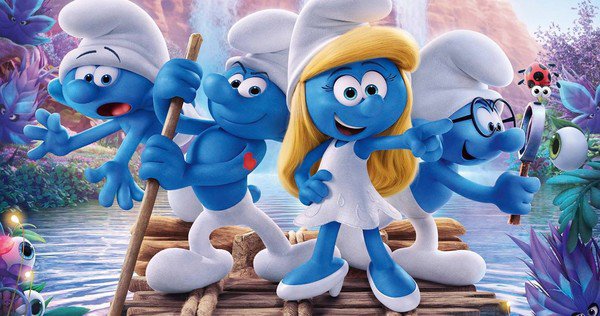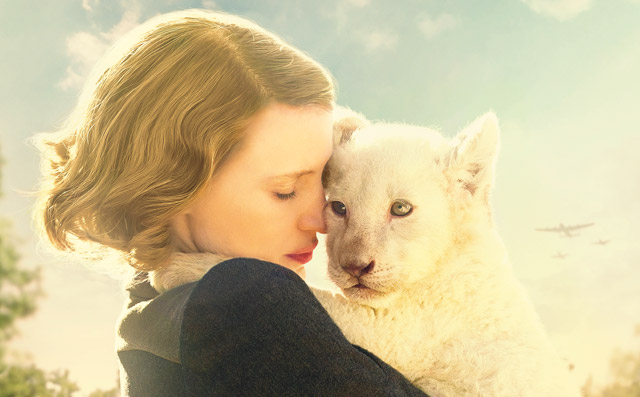A short spoiler-free review of Smurfs: The Lost Village, to help you decide if it’s worth seeing. Aaron discusses his history with the Smurfs, previous film versions, and also gives his emotional takeaway.


A short spoiler-free review of Smurfs: The Lost Village, to help you decide if it’s worth seeing. Aaron discusses his history with the Smurfs, previous film versions, and also gives his emotional takeaway.

Rating:
The Zookeeper’s Wife, baed on the novel by Diane Ackerman, recounts the true story of Antonina and Jan Żabiński, and how they secretly used the Warsaw Zoo to save over 300 Jews who had been imprisoned during the German invasion of Poland in 1939. Tackling the Holocaust is no new thing for Hollywood, as dozens (if not hundreds) of films and documentaries exist, telling the stories of those who suffered in the world’s greatest genocide. It might be easy, in fact, to brush aside The Zookeeper’s Wife, and assume it cannot reach the greatness of films like Sophie’s Choice, Schindler’s List, Life is Beautiful, or The Pianist. But that would be a mistake.
The first thing you’ll (hopefully) notice, during the credits, is that this film is written/adapted and directed by women. Niki Caro helms the co-written project by original author Diane Ackerman and Angela Workman. Considering the story is based on the discovered journals of Antonina Żabiński and told mostly from her perspective, these are fantastic choices. If you haven’t heard, Hollywood has a real problem when it comes to opportunities for women, and The Zookeeper’s Wife is a perfect example of the great movies we can get when talented female artists are provided the chance to shine.
What makes The Zookeeper’s Wife stand out in a crowd of Holocaust-themed films is its blend of genre and style. A large portion of the movie’s opening is spent getting to know Antonina and Jan Żabiński. We are given the chance to connect with why this zoo is so important to them and really get a feel for their character – the same traits that will eventually lead them to caring for needy Jews instead of animals. The movie’s focus on the zoo early on will make animal lovers very happy. As the film progresses it has sections that feel very biopic in nature, while others are dramatic, and yet other scenes capture a real sense of war (with some stunning cinematography by Andrij Parekh). One gorgeously shot scene of note has a family being surprised by the snow they notice on a hot summer’s day, only to realize as it falls around them that it isn’t snow at all, but ash, something indicative of a nearby tragedy. This powerful, emotional moment is one of several in the film where its iconic imagery will become burned into your mind as you recall the feelings you experienced when seeing it on screen. The film also does not shy away from the horror of what Nazi Germany did to the many Jews of European nations. There are a few gasp-worthy moments but nothing too bloody. Be warned – animals do perish, and sometimes in heartbreaking manner, so young viewers who may be affected by seeing this should probably avoid this film.
Jessica Chastain leads a slew of great performances and exhibits an elegant strength that is perfect for this period setting. Her male co-stars are all up to the task, Daniel Brühl displaying a selfish disregard for both animal and human life while trying to outwardly proclaim that he has a soul, and Johan Heldenbergh tortured by his need to help others and fear of what this strain may do to his marriage.
The Zookeeper’s Wife is an incredible story. It’s portrait of empathy for the marginalized and oppressed comes at a time when the world really needs to see it. The Żabińskis were not Jews themselves, but sacrificed greatly to fight against injustice simply because it showed up on their doorstep one day. Their efforts saved many lives and the film captures the emotional swings of this so well. This is an inspirational film well worth seeing and learning from, just don’t expect a dry eye while doing so.
Emotional Takeaway: RADICAL COMPASSION
Khen Lampert identifies compassion as a special case of empathy, directed towards the “other’s” distress. Radical compassion is a specific type of general compassion, which includes the inner imperative to change reality in order to alleviate the pain of others. This state of mind, according to Lampert’s theory, is universal, and stands at the root of the historical cry for social change. This is exactly what we see from Antonina and Jan Żabiński in The Zookeeper’s Wife. It is tragic and rage-inducing to see the what Nazi Germany did to Poland, but the takeaway here is that when people step up and forego their own safety and comfort to put others first, lives can be saved and history can be changed. See this film because it is a very well-made movie that tells a compelling story through great performances and technical mastery, but walk out of it with a renewed purpose and outlook on life outside of your personal bubble.

Rating:
The hype surrounding Kong: Skull Island had a decidedly Apocalypse Now feel to it. Based on the trailers and posters we’d seen, it appeared that director Jordan Vogt-Roberts was going to do his best at a Francis Ford Coppola impression. Were we truly about to see the merging of a dramatically brilliant war film with the unapologetic campiness of a monster-focused blockbuster? In a sense, we did. And what’s really crazy is… it worked.
Where Vogt-Roberts draws inspiration, however, is not from the dramatic human stories we see in war epics like Apocalypse Now. Instead, he focuses on using the beautifully shot landscapes, often bathed in fire or backed by a burning sun, to give the adventure on Skull Island a Vietnam flare. The colors, especially red and orange, are bright and the island itself is incredible to look at on a big screen. With its lush jungles, towering mountains, and various unique animal species, there is never a moment where we do not feel in complete awe of the locale. Additionally, he takes cues from classic Vietnam pictures in the way his action is shot. Often it has a horror feel to it, with blood splatters and the loss of limbs displaying the true terrors of a fight against something so much more powerful and primal than our characters have ever seen. The action is fast-paced and has that blockbuster intensity that gets blood pumping. And it is in this stylized action (brought to us by long time Zack Snyder cinematographer Larry Fong) that we begin to really understand what kind of film Kong: Skull Island is supposed to be.
Above all else, this monster movie is meant to be FUN. If you’re expecting this A-list cast of award-winning actors to wow you with incredible dramatic performances, you’re going to be highly disappointed. If, however, you like your monster movies classic style, with a dose of campiness and a focus on the monsters themselves, you are in for a treat. Our main characters are mostly given back stories, with the inexplicable exception of Tian Jing’s biologist (?) who hardly is ever even noticed, and they fulfill the roles required of them with aplomb. Essentially they seem to serve as varying viewpoints on how the discovery of Kong and Skull Island should be handled. Samuel L. Jackson, for example, is perfect as the commander who just isn’t ready to hang up his rifle and is willing to lead his unit into harm’s way to hold on for one minute more and one last fight, regardless of any logic that may say otherwise. This movie is about Kong, though, and by keeping the character stories from overpowering the narrative Vogt-Roberts allows us to never get dragged down into the drama, instead simply using the humans as a means of getting us from big action sequence to monster fight in an entertaining and often humorous manner. Not much is felt for the ones who perish and that is by design, because this isn’t really their story. It also would have been easy to let Brie Larson’s character become a love interest of the ape, for old time’s sake, but the restraint shown here instead paints a more “realistic” picture of two species trying to understand each other via non-verbal communication and then protecting those who’ve protected you.
Thankfully this is a story about the island, about Kong and its other less friendly inhabitants. They are rightfully the star of this picture and every scene with Kong in it is incredible. Particularly, his shining monster vs. monster moment is worth the price of admission alone and the creature design throughout is stunning, the perfect mix of creepy and amazing. Also of note (though not a beast) is John C. Reilly who steals every scene he’s in and serves as much more than just a comedic side note, but rather the heart of the human component in the film.
After suffering through Hollywood’s recent attempts at more serious monster movie fare, it was absolutely refreshing to sit with my 12-year old son, mouth agape, ooh’ing and aah’ing as a gigantic towering ape did the exact things a gigantic towering ape should do in this scenario. It was just over-the-top enough to hit the right notes without becoming a drawback. From the looks of the post-credits scene, it appears that we’re in for a connected world of monster films with some A-list stars continuing forward. So while Kong may not quite have been a perfect film, it’s a solid effort and serves as a fantastic starting point to build around, much like Marvel has accomplished with its comic book universe.
Emotional Takeaway: EXCITEMENT
Not only for its big screen thrills and frantic, stylized action sequences, but because Kong ushers in a new era of monster movies for this generation to enjoy. Here’s hoping we embrace these films with a childlike passion and let pure blockbuster fun reignite our over-dramatized movie-going souls. See it on a big screen, let yourself go, and just enjoy the ride. The King is back.